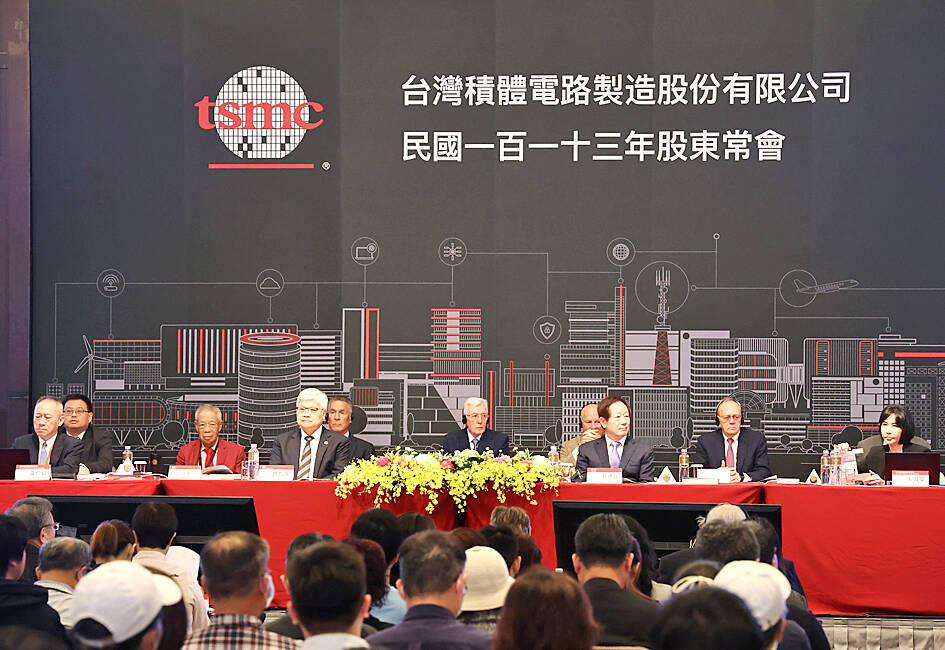Taiwan Semiconductor Manufacturing Co (TSMC, 台積電), the world’s biggest contract chipmaker, yesterday said it is optimistic about its business outlook over the next few years, benefiting from the uptake of artificial intelligence (AI) applications.
TSMC produces AI chips for a majority of AI chip designers from Nvidia Corp to Advanced Micro Devices Inc (AMD), using its cutting-edge process technologies, including 3 nanometers, 4 nanometers and 5 nanometers.
“We are optimistic about AI. [Demand] is really hot. Besides, AI applications are just in its infancy. More and more AI applications will be used in our daily lives,” TSMC chief executive officer and new chairman C.C. Wei (魏哲家) told a media briefing. “TSMC’s [business] outlook for the next few years will be very optimistic.”

Photo: CNA
TSMC’s board of directors yesterday tapped Wei to succeed Mark Liu (劉德音), who served as company chairman for the past six years.
Since there would be a wide spectrum of AI applications for different vertical industries, Wei said he could not agree more with Nvidia Corp CEO Jensen Huang’s (黃仁勳) bullish view about AI growth, Wei said.
The AI market would swell to US$100 trillion, Huang estimated.
TSMC would be a major beneficiary of this AI boom, given its technology leadership, Wei said.
Because of its strong technological capabilities, TSMC occupies a “very advantageous position,” Wei said.
That means “no one can compete with us so far — and we intend to maintain such an advantageous position,” he added.
Asked about a South Korean media report that Samsung Electronics Co is catching up with TSMC and nibbling on its turf, Wei said his company has no rival so far and doubted the publication’s trustworthiness.
TSMC has overtaken Intel Corp in offering the world’s most advanced foundry technology since 2018, when it rolled out 7-nanometer process technology.
Since then, the Taiwanese company has safeguarded its technology leadership position. The chipmaker plans to start mass production of 2-nanometer chips next year, ahead of its competitors.
“Since we continue advancing our technology ahead of [competitors], they have to adopt our technology,” Wei said. “TSMC does not develop any technology only for certain products or certain industries.”
The company’s secret formula behind its long-term technology leadership is that TSMC is always making progress, Wei said. That is why TSMC has an advantage over its competitors, he said.
Asked whether customers have asked TSMC to relocate its production outside of Taiwan because of escalating tensions between Taiwan and China, Wei said: “It had been discussed.”
However, it would be impossible to move all of the company’s production abroad, as 80 to 90 percent of its manufacturing capacity is based in Taiwan, he said, adding that he believed there was little chance of war.
Talking about the company’s approach to selecting the next leader, Wei, 71, said the company is working on a succession mechanism to ensure the company operates smoothly.
Whoever succeeds him should share the company’s values of maintaining its technological leadership, expanding capacity and winning customers’ trust, Wei said.

MULTIFACETED: A task force has analyzed possible scenarios and created responses to assist domestic industries in dealing with US tariffs, the economics minister said The Executive Yuan is tomorrow to announce countermeasures to US President Donald Trump’s planned reciprocal tariffs, although the details of the plan would not be made public until Monday next week, Minister of Economic Affairs J.W. Kuo (郭智輝) said yesterday. The Cabinet established an economic and trade task force in November last year to deal with US trade and tariff related issues, Kuo told reporters outside the legislature in Taipei. The task force has been analyzing and evaluating all kinds of scenarios to identify suitable responses and determine how best to assist domestic industries in managing the effects of Trump’s tariffs, he

TIGHT-LIPPED: UMC said it had no merger plans at the moment, after Nikkei Asia reported that the firm and GlobalFoundries were considering restarting merger talks United Microelectronics Corp (UMC, 聯電), the world’s No. 4 contract chipmaker, yesterday launched a new US$5 billion 12-inch chip factory in Singapore as part of its latest effort to diversify its manufacturing footprint amid growing geopolitical risks. The new factory, adjacent to UMC’s existing Singapore fab in the Pasir Res Wafer Fab Park, is scheduled to enter volume production next year, utilizing mature 22-nanometer and 28-nanometer process technologies, UMC said in a statement. The company plans to invest US$5 billion during the first phase of the new fab, which would have an installed capacity of 30,000 12-inch wafers per month, it said. The

Taiwan’s official purchasing managers’ index (PMI) last month rose 0.2 percentage points to 54.2, in a second consecutive month of expansion, thanks to front-loading demand intended to avoid potential US tariff hikes, the Chung-Hua Institution for Economic Research (CIER, 中華經濟研究院) said yesterday. While short-term demand appeared robust, uncertainties rose due to US President Donald Trump’s unpredictable trade policy, CIER president Lien Hsien-ming (連賢明) told a news conference in Taipei. Taiwan’s economy this year would be characterized by high-level fluctuations and the volatility would be wilder than most expect, Lien said Demand for electronics, particularly semiconductors, continues to benefit from US technology giants’ effort

‘SWASTICAR’: Tesla CEO Elon Musk’s close association with Donald Trump has prompted opponents to brand him a ‘Nazi’ and resulted in a dramatic drop in sales Demonstrators descended on Tesla Inc dealerships across the US, and in Europe and Canada on Saturday to protest company chief Elon Musk, who has amassed extraordinary power as a top adviser to US President Donald Trump. Waving signs with messages such as “Musk is stealing our money” and “Reclaim our country,” the protests largely took place peacefully following fiery episodes of vandalism on Tesla vehicles, dealerships and other facilities in recent weeks that US officials have denounced as terrorism. Hundreds rallied on Saturday outside the Tesla dealership in Manhattan. Some blasted Musk, the world’s richest man, while others demanded the shuttering of his